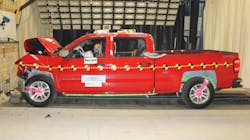The National Highway Traffic Safety Administration (NHTSA) has instructed General Motors (GM) to recall nearly six million trucks from the 2007-2014 model years that are equipped with Takata air bags. In addition to the GM vehicles, over 60 million are affected by this recall across 19 other automakers.
GM contended the instruction based on “multiple design differences” in the air bags and that the physical environment in the affected vehicles “better protects the front-passenger inflator from the extreme temperature cycling that can cause inflator rupture." GM submitted a request to have the 5.9 million vehicles exempt but was denied by the NHTSA. The recall is estimated to cost the company $1.2 billion, about one-third of its net income so far this year, the Associated Press reported.
In 2019, GM had to recall 3.4 million pickup trucks and SUVs due to a vacuum pump defect that made it more difficult for vehicles to brake at low speeds. The problem stemmed from excessive debris and sludge build up on the vacuum pump filter screen as the engine oil lubricated it, leading to a drop in vacuum and more pressure required to brake.
“The safety and trust of those who drive our vehicles is at the forefront of everything we do at General Motors. Although we believe a recall of these vehicles is not warranted based on the factual and scientific record, NHTSA has directed that we replace the air bag inflators in the vehicles in question,” said GM in a statement to Fox Business. “Based on data generated through independent scientific evaluation conducted over several years, we disagree with NHTSA’s position. However, we will abide by NHTSA’s decision and begin taking the necessary steps.”
According to the recall order, the deaths of at least 30 people are attributable to these rupturing Takata inflators globally – 18 people in the United States. During the faulty air bag deployment, this propellant degradation can cause the inflator to over-pressurize, causing sharp metal fragments – like shrapnel – to penetrate the air bag and enter the vehicle compartment.
Owners of the affected vehicles can check here if their vehicles have been recalled and key in their 17-digit vehicle identification number.
The affected GM vehicles are:
- Chevrolet Silverado and GMC Sierra 1500, 2500 and 3500 models
- Chevrolet Tahoe
- Chevrolet Suburban
- Chevrolet Avalanche
- GMC Yukon
- Cadillac Escalade
About the Author
Catharine Conway
Digital Editor
Catharine Conway is a past FleetOwner digital editor who wrote for the publication from 2018 to 2022.

